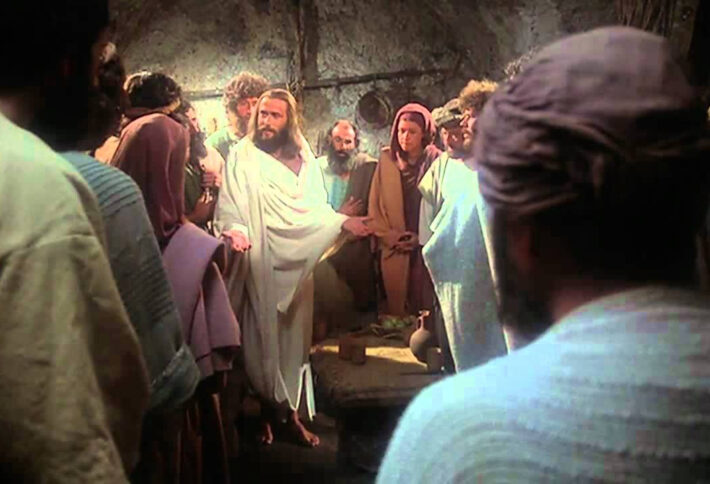Christian Art | Easter To Pentecost
Mark 16: 9-15 Audio Bible KJV | King James Audio Bible | Daily Verses
9 ¶ Now when Jesus was risen early the first day of the week, he appeared first to Mary Magdalene, out of whom he had cast seven devils.
10 And she went and told them that had been with him, as they mourned and wept.
11 And they, when they had heard that he was alive, and had been seen of her, believed not.
12 ¶ After that he appeared in another form unto two of them, as they walked, and went into the country.
13 And they went and told it unto the residue: neither believed they them.
14 ¶ Afterward he appeared unto the eleven as they sat at meat, and upbraided them with their unbelief and hardness of heart, because they believed not them which had seen him after he was risen.
15 And he said unto them, Go ye into all the world, and preach the gospel to every creature.
In his brief, summary account of Jesus’ appearances following his crucifixion and resurrection, Mark stresses the disciples’ disbelief and their reluctance to accept the fact of the resurrection. Mary Magdalene first tries to share the good news. The disciples do not believe her. The two disciples, who are probably the two who meet Jesus on the way to Emmaus (cf. Luke 24: 13-35), are similarly not believed when they tell of what they have witnessed. Finally, Jesus appears to the eleven apostles, upbraiding them for their lack of belief, before he goes on to command them to preach the Gospel to the whole of creation. The question of belief is closely tied to the mission to evangelize given to the apostles.
Mark offers the disciples’ reluctance to believe as a further guarantee of the truth of Christ’s resurrection. The disciples themselves, those who have lived with Jesus during his ministry, cannot at first accept that what Jesus has told them must happen, and which has happened, is true and real. Through these Bible verses, we see the disciples’ need for proof. It can hardly be said that these early Christians were naïve. They need to see Jesus with their own eyes. Jesus gives them the proof they need by appearing to them. This, then, enables the disciples to be eye-witnesses, who can now affirm the truth of what they have seen as irrefutable fact.
St Gregory the Great writes: ‘The reason why the disciples were slow to believe in the Resurrection was not so much due to their weakness as to our future firmness in the faith; what other purposes does this have (the very Resurrection being demonstrated by many arguments to those who were in doubt) than that our faith should be strengthened by our doubt?’
The disciples, then, are sent to preach the Gospel to everyone. Jesus tells his disciples that his truth transcends all differences. It does not matter what race we are or what nation we belong to. We are one brotherhood of man – of humankind. Just as we are all called to share in the Lord’s Supper, so we are called to bear witness to all the people we know, to share our belief and our joy, to do good in the world and, by our words or by example, to call everyone we know to Jesus. The Bible is truly a living text. We are a testament.
‘Blessed are they that have not even seen and yet have believed’ (John 20: 29)
![]()

Audio Bible KJV | King James Version | Endnotes
The Disciples Do Not Believe Mary Magdalene That Jesus Has Risen | Doubt And Faith
The passage in Mark 16:9-15 presents a powerful illustration of how faith and doubt can intersect in the Christian experience. Mary Magdalene, who had previously been healed by Jesus of seven demons (Luke 8:2), is the first person to see the risen Christ. Mary Magdalene rushes to tell the disciples, but they do not believe her. When Jesus appears to all the disciples, Jesus rebukes them for their lack of faith.
The disciples’ initial skepticism of Mary’s report is a reminder that doubt is a natural part of the human experience. As theologian Paul Tillich wrote: ‘Doubt is not the opposite of faith; it is one element of faith.’ Doubt can arise from a variety of sources, such as a lack of evidence or personal experience, conflicting information, or cultural influences. Doubt can also be a result of intellectual inquiry and a desire for a deeper understanding of faith.
However, doubt can also become a barrier to faith if it is not addressed. The disciples’ initial disbelief of Mary’s testimony is an example of how doubt can hinder belief in God’s work. In John 20:29, Jesus says: ‘Because thou hast seen me, thou hast believed: blessed are they that have not seen, and yet have believed.’ Jesus teaches that faith can exist without the need for empirical evidence, but it requires a willingness to accept the possibility of things beyond our understanding.
Through Christian history, theologians have explored the connection of doubt and faith. Saint Augustine wrote about the importance of doubt in shaping faith, saying: ‘Doubt is the beginning of wisdom.’ He argued that doubt can help us to ask questions and seek answers that ultimately lead us to a deeper understanding of God’s work.
Similarly, Saint Thomas Aquinas wrote of the importance of doubt in the pursuit of truth. He argued that doubt can be a sign of intellectual humility and a willingness to seek out knowledge beyond our current understanding. In his Summa Theologiae, he wrote: ‘The intellect is moved by the object it understands to assent to it or dissent from it. Hence, the result of the consideration of the intellect is that we either believe or doubt or deny.’
Protestant reformer Martin Luther also wrote about the role of doubt in shaping faith. In his Commentary On Romans, he wrote: ‘Doubt is a necessary ingredient in knowledge. It is the child of inquiry.’ Luther believed that doubt can lead to a deeper understanding of God’s word and a stronger faith.
Faith And Reason
The theme of doubt and faith is reflected in the Catholic Church’s teachings on the role of reason and faith in the Christian life. The Catechism of the Catholic Church states that ‘Faith and reason are like two wings on which the human spirit rises to the contemplation of truth’ (CCC 156). This statement emphasizes the importance of both faith and reason in the Christian experience, and acknowledges the role of doubt and skepticism in shaping one’s beliefs.
The Catholic Church also recognizes that doubt and skepticism can arise from a variety of sources, including intellectual inquiry, cultural influences, and personal experience. The Church encourages believers to address these doubts and seek answers through prayer, study, and dialogue with other believers.
In his encyclical Fides Et Ratio, Pope John Paul II wrote about the importance of reason in the Christian life, saying that ‘Faith and reason are necessary for each other, each by itself being incomplete and insufficient’ (FR 104). Pope John Paul II emphasized that reason can help to clarify and deepen one’s faith, but it is not the ultimate source of truth.
Protestant theologian John Calvin wrote about the importance of reason in the Christian life. He argued that reason can help to confirm and strengthen one’s faith, but it should always be subservient to the authority of scripture. In his Institutes Of The Christian Religion, he wrote: ‘The word of God is above all human judgment. We are not to allow ourselves to be led or influenced in any way by what is brought forward by reason or the senses, but must always subject our judgment to the word of God.’
The story of Mary Magdalene and the disciples in Mark 16:9-15 also raises important questions about the nature of faith and the role of personal experience in shaping our beliefs.
For the disciples, the news of Jesus’ resurrection was met with skepticism and doubt. Despite Mary Magdalene’s testimony and the evidence presented to them, they struggled to believe that Jesus had truly risen from the dead. This reaction is not uncommon in the Christian tradition, as doubts and questions about the nature of faith have been a part of the faith journey for many believers throughout history.
A famous example in the Gospels of this struggle with doubt is Saint Thomas, who is known for his initial skepticism about Jesus’ resurrection. In John 20:24-29, ‘Doubting Thomas’ declares that he will not believe that Jesus has risen until he sees and touches the wounds in his hands and side. When Jesus appears to Thomas and invites him to do just that, Thomas responds with a powerful statement of faith: ‘My Lord and my God!’ (John 20:28)
The story of Thomas highlights the important role that personal experience can play in shaping our beliefs. While faith is often based on an acceptance of certain teachings or dogmas, it is also deeply rooted in personal encounters with God and the divine. As theologian Paul Tillich wrote: ‘Doubt is not the opposite of faith; it is one element of faith.’Sensus Fidei | Sense Of Faith
In the Catholic tradition, the role of personal experience in shaping one’s beliefs is often referred to as ‘sensus fidei’, or the sense of faith. This concept emphasizes the importance of the lived experience of believers in shaping the teachings and practices of the Church. As the Second Vatican Council stated: ‘The entire body of the faithful, anointed as they are by the Holy One, cannot err in matters of belief.’ (Lumen Gentium 12)
Protestant theologian Martin Luther emphasized the importance of personal experience in shaping one’s faith. He argued that the ultimate source of religious authority was not the teachings of the Church or the interpretations of scholars, but the individual believer’s encounter with God through prayer and scripture.
Finally, in the highly recommended book The Screwtape Letters, C.S. Lewis writes that ‘the presence of faith does not mean the absence of doubt’. C.S. Lewis, author of the Narnia novels, argues that doubt can actually be a sign of a healthy and active faith, as it pushes us to seek answers and to understand our beliefs more deeply.








